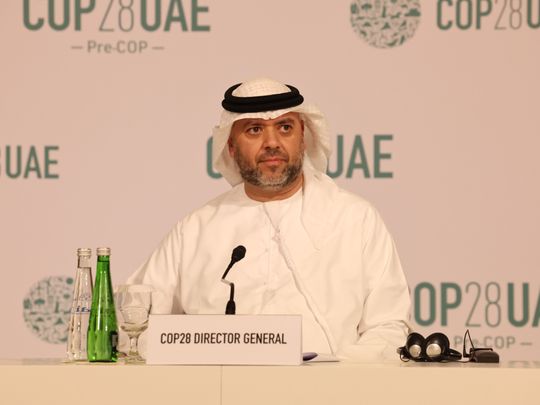
Abu Dhabi: The Pre-COP meetings in Abu Dhabi today rolled out action plans and high-level discussions to set the ground for addressing Global Stocktake and delivering a Loss and Damage Fund at COP28.
A Transitional Committee Meeting on Loss and Damage Fund and a meeting with heads of some of the Multilateral Development Banks on climate financing were the immediate high-level meetings resulted from the Pre-COP meetings.
At a press conference following the two-day Pre-COP meetings on Tuesday, the Director-General of COP28, Ambassador Majid Al Suwaidi ,outlined critical issues and key takeaways from the preliminary discussions that set the stage for COP28.
The talks centred around setting up a “loss and damage” fund for poorer nations hit by climate change and on the Global Stocktake (GST), a key component of the Paris Agreement to assess and review the collective progress of countries in addressing climate change.
“On loss and damage, we will soon be hosting the fifth Transitional Committee Meeting from November 3 to 5. We’re hopeful of positive progress with clear and clean and strong recommendations that can be brought forward to COP 28,” said Al Suwaidi.
He said the Independent High-Level Expert Group on Climate Finance (IHLEG) presented its latest work to advance the agenda to fix climate finance.
MDB Meeting
Looking ahead on Multilateral Development Bank (MDB) reform, he said: “We’re hosting a meeting of 10 multilateral development banks with the President tomorrow.”
The heads of those banks will be asked: How to work better together as a system through country platforms, how to lower risk for the private sector and mobilise trillions and how to lay the foundation for a new framework on climate finance based on the report of the IHLEG.
Global Stocktake
“On the Global Stocktake, we have been clear that COP28 must deliver a robust, balanced and transformational decision across all pillars,” said Al Suwaidi.
He said several key questions were posed during the Pre-COP meeting, seeking pathways to provide a credible response for closing existing gaps in climate action. The discussions also focused on shifting financial flows to scale up support for developing countries.
Discussions were held on how GST can be considered an essential tool for informing national policymaking by updating and enhancing Nationally Determined Contributions (NDCs), the climate action plan to cut emissions and adapt to climate impacts by each Party to the Paris Agreement.
According to Al Suwaidi, Pre-COP discussions also highlighted equity and science as crucial elements in shaping the GST, ensuring that fairness and scientific accuracy guide its processes.
The Director-General noted that the Pre-COP meetings presented GST as the opportunity to course correct global climate efforts.
“Over the last two days, many have spoken about how we must seize the Global Stocktake as an opportunity to course correct. We want to build on this momentum and consensus at COP28.”
He said Parties have been urged to come to COP28 prepared to raise collective ambition, recognising the urgency of the climate crisis and the need for decisive action.
Billions to trillions
Developing countries had proposed that a new UN fund unlock at least $100 billion by 2030 to address irreversible damage caused by climate change.
Al Suwaidi pointed out that the 100 billion commitment, made 14 years ago, remains unfulfilled, eroding trust in the process.
“We must resolve this, as it concerns how developed countries support the transition of developing nations to a cleaner future.”
He said shifting from billions to trillions is imperative, requiring GST recapitalisation, loss and damage pledges, and concessional finance to mobilise capital.
Private sector involvement necessitates a framework to empower this process. Collaboration with international financial institutions and multilateral development banks is essential to gear the system towards climate action, enabling developing and emerging economies to make informed choices for their energy systems and climate adaptation, Al Suwaidi said.
Inclusivity
He said inclusivity forms the foundation of the approach and stands as a fundamental pillar of the COP28 Presidency.
“Put simply, everyone is welcome because everyone is needed. That is why we have brought together over 70 ministers and 100 delegations in the largest Pre-COP ever.”
Extending appreciation to the dedicated youth delegates who actively participated in the sessions over the past two days, he said: “Your perspectives have brought into focus what is at stake in our discussions. Your passion, your energy, and your determination should be at the front of all our minds
as we seek to build consensus and momentum on the difficult issues we face. Your unique perspectives have shed light on the significance of our discussions. Your fervor, enthusiasm, and unwavering commitment should guide us as we work towards consensus and momentum on the challenging issues before us.






